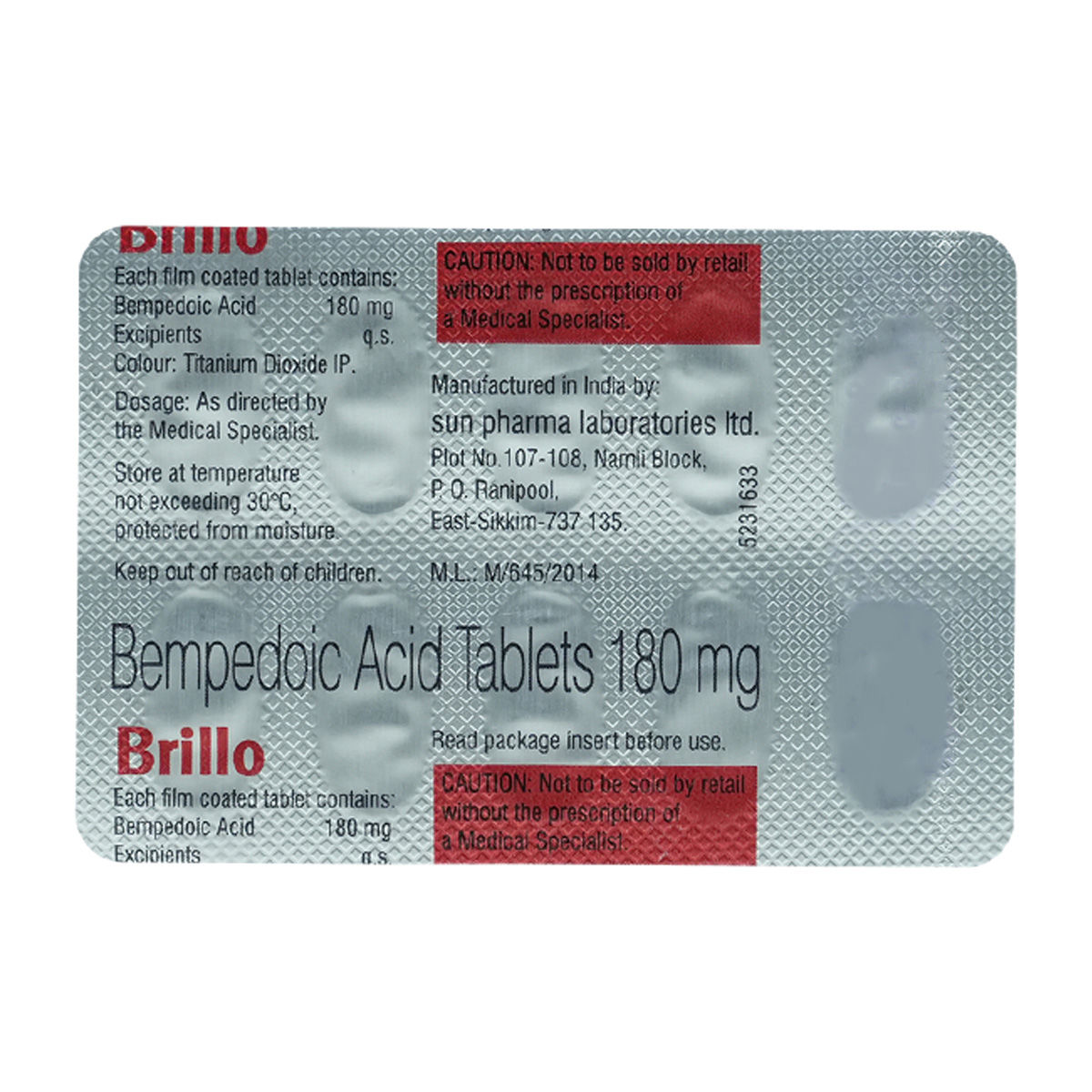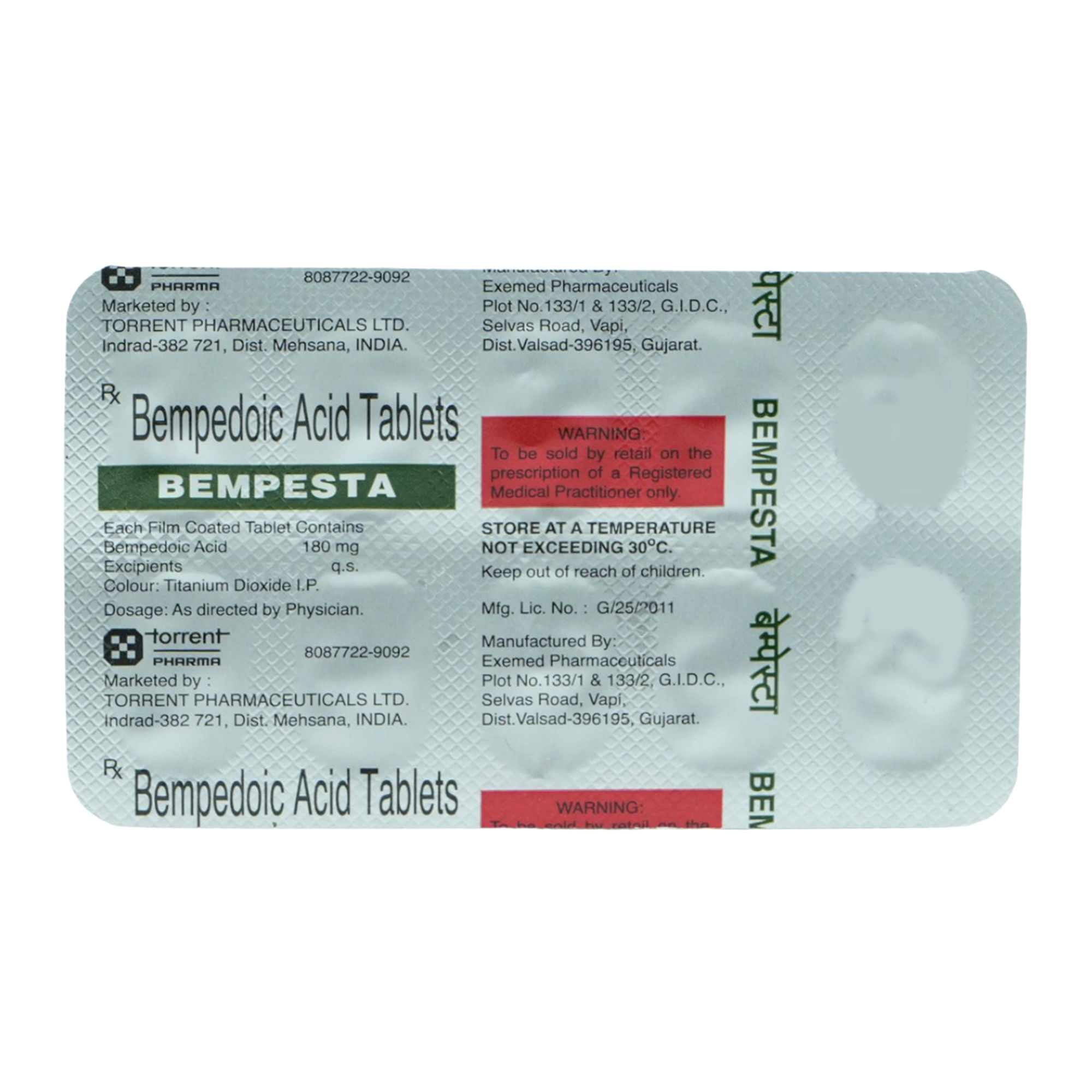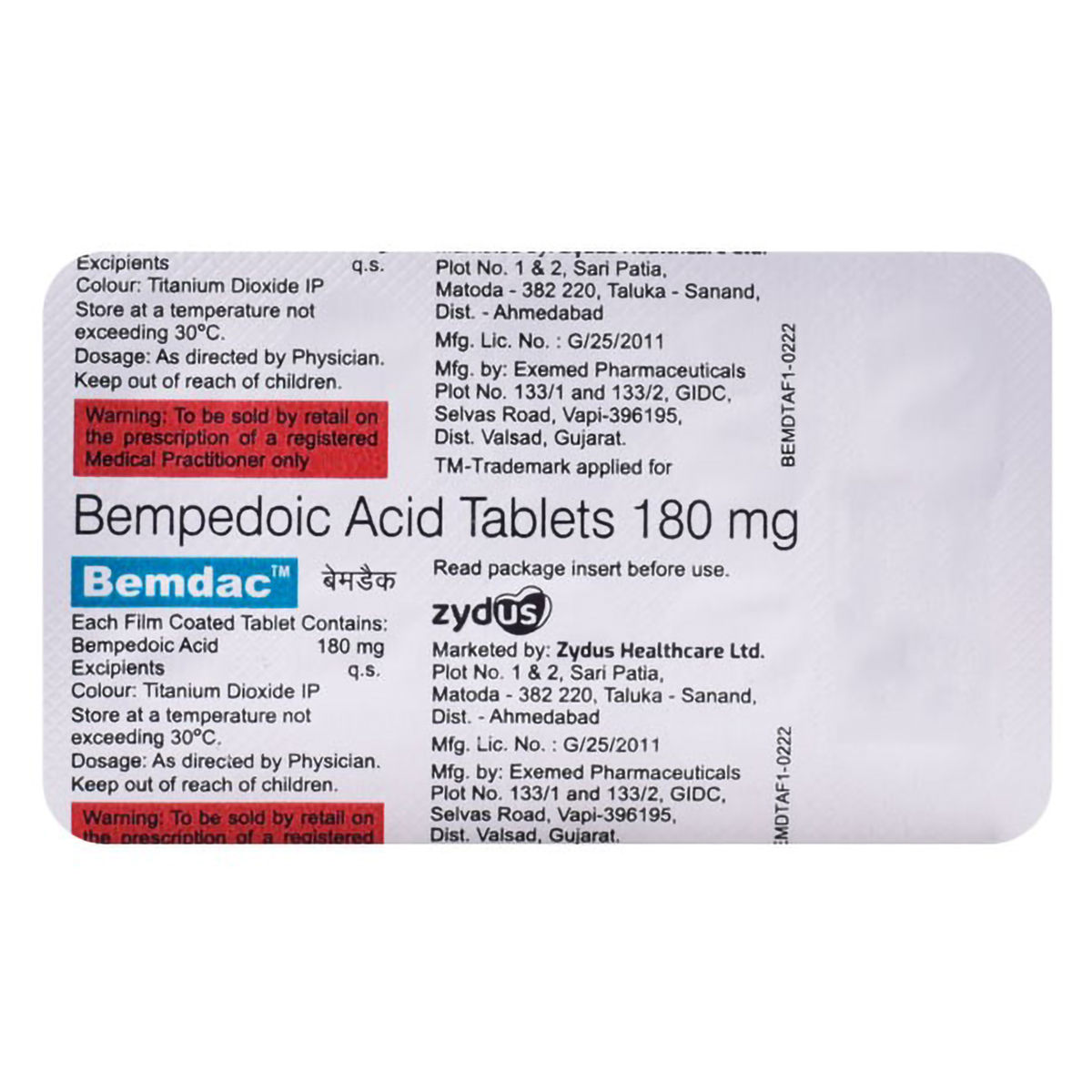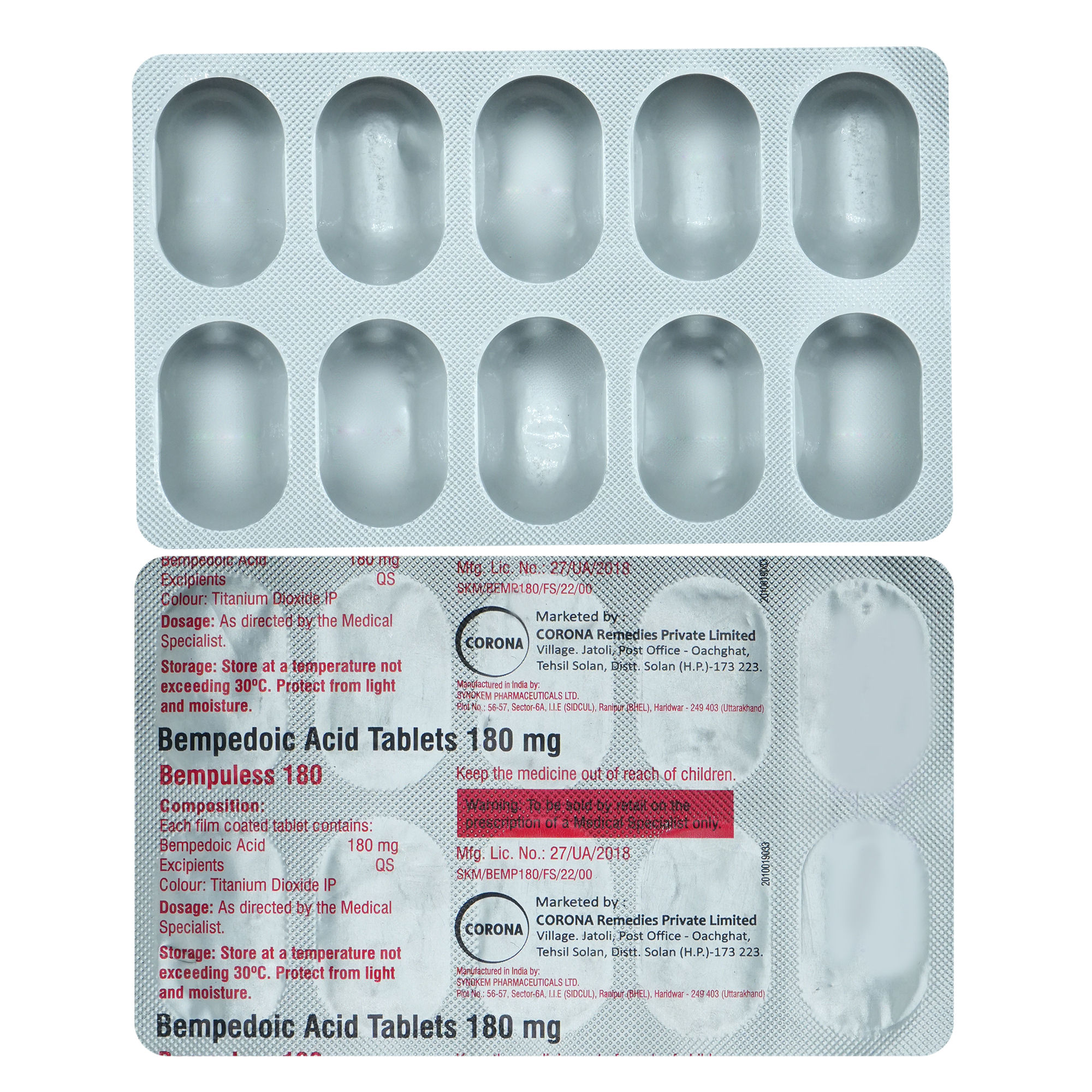Dapcea Tablet
Dapcea Tablet is used to lower the high cholesterol together with lifestyle changes (diet, weight loss, exercise). It contains Bempedoic acid, which works by blocking an enzyme (ATP citrate lyase) needed for the production of cholesterol. This helps block the production of cholesterol in the liver and increases the removal of LDL cholesterol. Thereby, it helps decrease bad cholesterol in the body.
₹288*
MRP ₹320
10% off
₹272*
MRP ₹320
15% CB
₹48 cashback(15%)
Free Delivery
With Circle membership
(Inclusive of all Taxes)
This offer price is valid on orders above ₹800. Apply coupon PHARMA10/PHARMA18 (excluding restricted items)
Provide Delivery Location

Whats That

Secure Payment

India's Most Trusted Pharmacy

Genuine Products
Composition
Manufacturer/Marketer
Consume Type
Return Policy
About Dapcea Tablet
Dapcea Tablet is used together with lifestyle changes and certain cholesterol-lowering medicines to decrease bad cholesterol in patients with heart disease or familial heterozygous hypercholesterolemia (an inherited condition in which cholesterol cannot be removed from the body normally).
Dapcea Tablet contains Bempedoic acid, which works by blocking an enzyme (ATP citrate lyase) needed for the production of cholesterol. This helps block the production of cholesterol in the liver and increases the removal of LDL cholesterol. Thereby, it helps decrease bad cholesterol in the body.
In some cases, Dapcea Tablet may cause side effects such as anaemia, gout, and pain in the shoulders, arms or legs. Most of these side effects may not require medical attention and resolve gradually over time. However, you are advised to talk to your doctor if the side effects persist or worsen.
Do not take Dapcea Tablet if you are pregnant or breastfeeding. Dapcea Tablet is not recommended for children below 18 years as the safety and effectiveness have not been established. Inform the doctor regarding your health condition and medicines you are taking to rule out any possible side effects/interactions.
Uses of Dapcea Tablet
Medicinal Benefits
Dapcea Tablet belongs to a group of medicines called adenosine triphosphate-citrate lyase (ACL) inhibitors used in addition to the cholesterol-lowering diet in adult patients with primary hypercholesterolaemia (high cholesterol) or mixed dyslipidaemia (imbalance of lipids), which are conditions that cause a high cholesterol level in the blood. Dapcea Tablet contains Bempedoic acid, which works by blocking an enzyme (ATP citrate lyase) needed for the production of cholesterol. This helps block the production of cholesterol in the liver and increases the removal of LDL cholesterol. Thereby, it helps decrease bad cholesterol in the body.
Directions for Use
Storage
Side Effects of Dapcea Tablet
- Anaemia (low red blood cells)
- Gout (increased levels of uric acid)
- Pain in arms, legs, or shoulders
- Muscle spasms
Drug Warnings
Do not take Dapcea Tablet if you are allergic to any of its components, if you are pregnant or breastfeeding. Inform the doctor if you have/had gout, severe kidney or liver problems, or tendon problems. Consult the doctor immediately if you become pregnant during treatment with Dapcea Tablet. Seek medical attention if you experience symptoms of gout (tender joints, joint redness, severe foot pain, especially in the toe joint, warm joints, and swelling), tendon problems (pain, swelling, tears and inflammation of tendons), or tendon rupture (hear or feel a snap or pop in a tendon area, bruising right after an injury in a tendon area, or are unable to move the affected area or put weight on the affected area).
Drug Interactions
Drug-Drug Interactions: Inform the doctor if you are taking statins (atorvastatin, fluvastatin, pitavastatin, pravastatin, rosuvastatin, simvastatin), medicine used to treat pulmonary artery hypertension (bosentan), anti-hypertensive (fimasartan), or medicines used to treat hepatitis C (asunaprevir, glecaprevir, grazoprevir, voxilaprevir).
Drug-Food Interactions: No interactions found.
Drug-Disease Interactions: Inform the doctor if you have gout/hyperuricemia (high uric acid levels), tendon problems, or severe kidney or liver problems.
Drug-Drug Interactions Checker List
- ATORVASTATIN
- FLUVASTATIN
- PITAVASTATIN
- PRAVASTATIN
- ROSUVASTATIN
- SIMVASTATIN
- BOSENTAN
- FIMASARTAN
- GLECAPREVIR
- GRAZOPREVIR
- VOXILAPREVIR
Habit Forming
Diet & Lifestyle Advise
- Follow a cholesterol-lowering diet.
- Exercise regularly. It helps in maintaining proper weight and lowers cholesterol.
- Limit salt and sugar intake.
- Avoid smoking and alcohol consumption.
- Choose healthy fats and cut down on trans fats.
- Include omega-3 fatty acids, fibre-rich food, fruits and vegetables.
- Get active by doing any physical activity such as swimming, brisk walking or jogging. Take stairs instead of elevators/lifts.
Special Advise
- Before starting the treatment, you should confirm you are not pregnant. Also, use effective contraception, as advised by your doctor during treatment with Dapcea Tablet.
- Dapcea Tablet treatment may increase liver enzyme levels. Your doctor may suggest tests to check your liver functioning while on treatment with this medicine.
Disease/Condition Glossary
High cholesterol: High cholesterol levels in the blood might build up on the walls of the arteries, leading to blockage of blood flow to the heart and other body parts, which could cause heart disease, heart attack or stroke. Cholesterol is mainly of two types, namely, 'bad cholesterol' and 'good cholesterol'. Bad cholesterol comprises low-density lipoprotein (LDL) and triglycerides (TG), which deposit fat in the arteries, leading to their blockage. Good cholesterol consists of high-density lipoprotein (HDL), which prevents the deposition of fats. Risk factors of high cholesterol are high-fat diet, obesity, lack of physical exercise, and smoking.
Alcohol
Consult your doctor
It is not known if alcohol interacts with Dapcea Tablet. Please consult a doctor.
Pregnancy
Unsafe
Dapcea Tablet may harm the unborn baby. Do not take Dapcea Tablet if you are pregnant, think you may be pregnant or if you are trying to become pregnant. Consult the doctor immediately if you become pregnant during treatment with Dapcea Tablet.
Breast Feeding
Unsafe
It is unknown if Bempedoic acid passes into breast milk. Do not take Dapcea Tablet if you are breastfeeding.
Driving
Safe
Dapcea Tablet has little or no influence on your ability to drive.
Liver
Caution
It is not known if Dapcea Tablet is safe and effective in people with liver disease. Please consult the doctor if you have a liver impairment or any concerns regarding this.
Kidney
Caution
It is not known if Dapcea Tablet is safe and effective in people with kidney disease, including end-stage kidney disease, who are on dialysis. Please consult the doctor if you have kidney impairment or any concerns regarding this.
Children
Unsafe
Dapcea Tablet is not recommended for children below 18 years as the safety and effectiveness have not been established.
Country of origin
Author Details
We provide you with authentic, trustworthy and relevant information
FAQs
Disclaimer
Product Substitutes




_0.jpg?tr=q-80)








